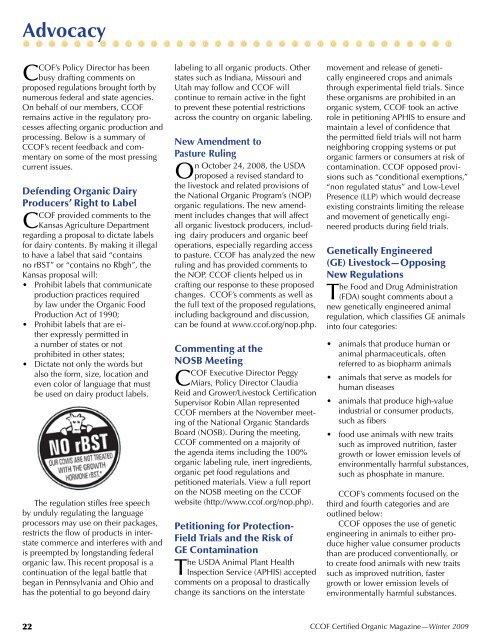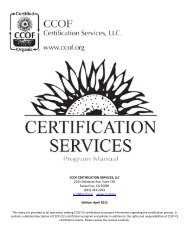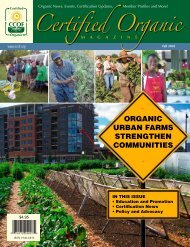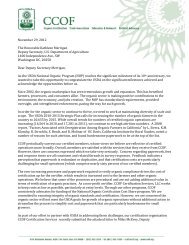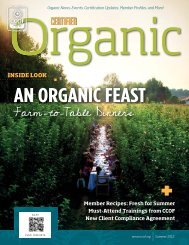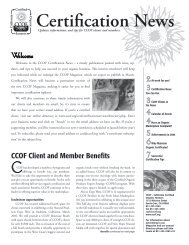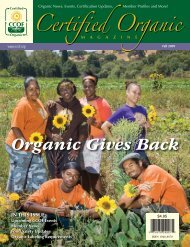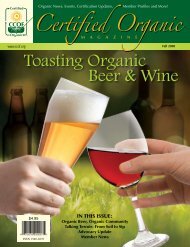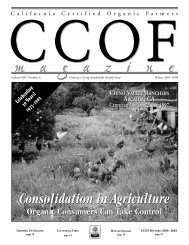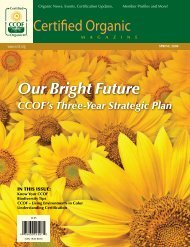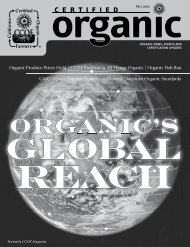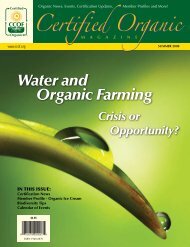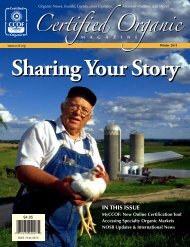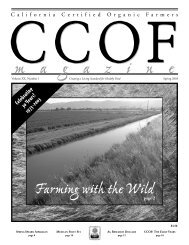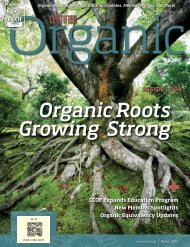The True Value of Organic - CCOF
The True Value of Organic - CCOF
The True Value of Organic - CCOF
- No tags were found...
You also want an ePaper? Increase the reach of your titles
YUMPU automatically turns print PDFs into web optimized ePapers that Google loves.
Advocacy<strong>CCOF</strong>’s Policy Director has beenbusy drafting comments onproposed regulations brought forth bynumerous federal and state agencies.On behalf <strong>of</strong> our members, <strong>CCOF</strong>remains active in the regulatory processesaffecting organic production andprocessing. Below is a summary <strong>of</strong><strong>CCOF</strong>’s recent feedback and commentaryon some <strong>of</strong> the most pressingcurrent issues.Defending <strong>Organic</strong> DairyProducers’ Right to Label<strong>CCOF</strong> provided comments to theKansas Agriculture Departmentregarding a proposal to dictate labelsfor dairy contents. By making it illegalto have a label that said “containsno rBST” or “contains no Rbgh”, theKansas proposal will:• Prohibit labels that communicateproduction practices requiredby law under the <strong>Organic</strong> FoodProduction Act <strong>of</strong> 1990;• Prohibit labels that are eitherexpressly permitted ina number <strong>of</strong> states or notprohibited in other states;• Dictate not only the words butalso the form, size, location andeven color <strong>of</strong> language that mustbe used on dairy product labels.<strong>The</strong> regulation stifles free speechby unduly regulating the languageprocessors may use on their packages,restricts the flow <strong>of</strong> products in interstatecommerce and interferes with andis preempted by longstanding federalorganic law. This recent proposal is acontinuation <strong>of</strong> the legal battle thatbegan in Pennsylvania and Ohio andhas the potential to go beyond dairylabeling to all organic products. Otherstates such as Indiana, Missouri andUtah may follow and <strong>CCOF</strong> willcontinue to remain active in the fightto prevent these potential restrictionsacross the country on organic labeling.New Amendment toPasture RulingOn October 24, 2008, the USDAproposed a revised standard tothe livestock and related provisions <strong>of</strong>the National <strong>Organic</strong> Program’s (NOP)organic regulations. <strong>The</strong> new amendmentincludes changes that will affectall organic livestock producers, includingdairy producers and organic beefoperations, especially regarding accessto pasture. <strong>CCOF</strong> has analyzed the newruling and has provided comments tothe NOP. <strong>CCOF</strong> clients helped us incrafting our response to these proposedchanges. <strong>CCOF</strong>’s comments as well asthe full text <strong>of</strong> the proposed regulations,including background and discussion,can be found at www.cc<strong>of</strong>.org/nop.php.Commenting at theNOSB Meeting<strong>CCOF</strong> Executive Director PeggyMiars, Policy Director ClaudiaReid and Grower/Livestock CertificationSupervisor Robin Allan represented<strong>CCOF</strong> members at the November meeting<strong>of</strong> the National <strong>Organic</strong> StandardsBoard (NOSB). During the meeting,<strong>CCOF</strong> commented on a majority <strong>of</strong>the agenda items including the 100%organic labeling rule, inert ingredients,organic pet food regulations andpetitioned materials. View a full reporton the NOSB meeting on the <strong>CCOF</strong>website (http://www.cc<strong>of</strong>.org/nop.php).Petitioning for Protection-Field Trials and the Risk <strong>of</strong>GE Contamination<strong>The</strong> USDA Animal Plant HealthInspection Service (APHIS) acceptedcomments on a proposal to drasticallychange its sanctions on the interstatemovement and release <strong>of</strong> geneticallyengineered crops and animalsthrough experimental field trials. Sincethese organisms are prohibited in anorganic system, <strong>CCOF</strong> took an activerole in petitioning APHIS to ensure andmaintain a level <strong>of</strong> confidence thatthe permitted field trials will not harmneighboring cropping systems or putorganic farmers or consumers at risk <strong>of</strong>contamination. <strong>CCOF</strong> opposed provisionssuch as “conditional exemptions,”“non regulated status” and Low-LevelPresence (LLP) which would decreaseexisting constraints limiting the releaseand movement <strong>of</strong> genetically engineeredproducts during field trials.Genetically Engineered(GE) Livestock—OpposingNew Regulations<strong>The</strong> Food and Drug Administration(FDA) sought comments about anew genetically engineered animalregulation, which classifies GE animalsinto four categories:• animals that produce human oranimal pharmaceuticals, <strong>of</strong>tenreferred to as biopharm animals• animals that serve as models forhuman diseases• animals that produce high-valueindustrial or consumer products,such as fibers• food use animals with new traitssuch as improved nutrition, fastergrowth or lower emission levels <strong>of</strong>environmentally harmful substances,such as phosphate in manure.<strong>CCOF</strong>’s comments focused on thethird and fourth categories and areoutlined below:<strong>CCOF</strong> opposes the use <strong>of</strong> geneticengineering in animals to either producehigher value consumer productsthan are produced conventionally, orto create food animals with new traitssuch as improved nutrition, fastergrowth or lower emission levels <strong>of</strong>environmentally harmful substances.22 <strong>CCOF</strong> Certified <strong>Organic</strong> Magazine—Winter 2009


